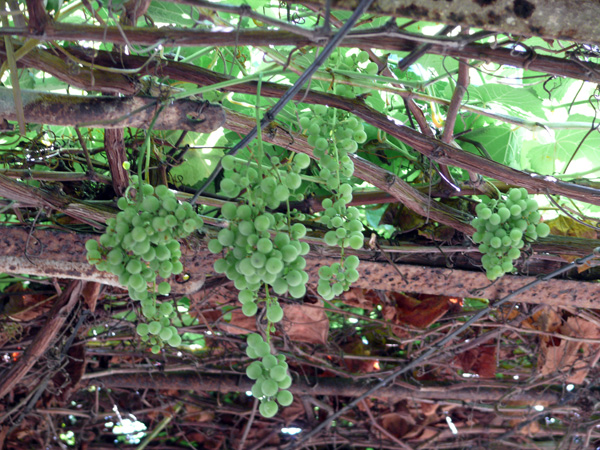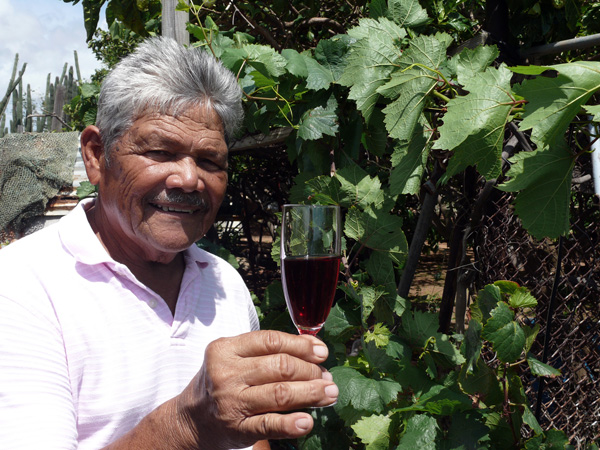ARUBA – The elderly man with the chiseled face and skin like leather walking towards us doesn’t look like a vintner. But then again, tropical Aruba doesn’t look like a wine growing region, either.
Vincente Kock swings open the gates to his modest home in Santa Cruz, a small town located in the middle of this Caribbean treasure, and waves us into a neatly-kept yard filled with barking dogs.
“I am so happy you have come to see me,” says the 73-year-old former insurance salesman who has become a local legend thanks to his unusual “hobby.”
Kock, who lives here with his wife and two daughters, leads us to his backyard where, shockingly, rows of hearty grape vines stand baking in the blistering Caribbean sun.
“Everyone is so surprised that I grow grapes in this climate but I’ve been doing it for 20 years now and my wine is pretty good,” smiles the proud man who says he started dreaming about making wine when he was a schoolboy.
“There was a house I used to pass every day on the way to and from school and the Dutchman who owned it had some grape vines growing in a pot on his porch,” remembers the likeable Kock.

Above: Hearty grapes can withstand the heat.
“It fascinated me how the grapes would grow every day and I vowed that one day I, too, would grow grapes on Aruba.”
Tropical regions present obvious climate hardships to growing grapes but these days Aruba has a particular problem – no water.
“We have been in a draught situation for almost two years,” says Kock, who gets water trucked to his home weekly to help nourish the vines.
Kock’s story has been featured in international magazines and newspapers and every year he welcomes inquisitive tourists to his home. Some have become friends and supply him with vines from places like France and Italy.
“People, especially Europeans, really appreciate the tradition of wine and are so pleased that I have made a success of it in these harsh conditions,” says Kock as he shows me some vines given to him as a gift by a French wine maker.
The hearty Mediterranean grape is what Kock features mostly in his tiny vineyard but he mixes other grapes with the Med variety, including sea grapes.
“They (sea grapes) give the wine a nice sweet taste,” says the man who traces his roots back to Aruba’s Aboriginals.
Aruba’s climate allows Kock to get two harvests a year – June/July and November/December. From the harvests he produces about 400 bottles under the label “Vino Vince” which he sells locally at craft shows and hotels.
“My daughter suggested the name Vino Vince and it sounded better than Vino Kock, so we went with it,” laughs the man, whose attractive label, featuring Aruba’s iconic diva-diva tree ,is, if nothing else, worth buying a bottle.
Kock stores the water needed to irrigate the vines in a small well filled with fish (tilapia).
“The fish keep the water clean and the vines need clean water.”
Kock once used a discarded jet engine casing to store the water – it still lies at the front of his property - but he finds the well is a better idea.
The man with the permanent smile on his face also grows many other fruits on his property – bananas, cherries, papayas and mandarins among them.

Above: Winemaker Vincente Kock.
He presses the grapes off property but ferments the wine in a cool shed at the back of his home.
Europeans, who like his wine when they open a bottle on the island, complain that Vino Vince does not taste the same when they get it back home. Kock is not surprised.
“Cool air will change the complexity of the wine I grow in this hot climate, so I always tell people to enjoy the wine while they are here.”
After showing us around the grounds, Kock invites us to pull up a chair in his kitchen and pours us a glass of his grape.
The light bodied vintage offers an interesting taste – a bit too young to impress, though.
Vino Vince may not be vintage wine but the man who makes it under the most grueling growing conditions, certainly is.
Cheers, Vincente Kock!
About the Author
Marc Atchison is a veteran journalist and a seasoned traveller with more than 20 years of travel writing experience. As the former Travel Editor of the Toronto Star, Canada's largest newspaper, and now Editor-in-Chief and Senior Writer for TraveLife magazine (Canada) and travelife.ca, Marc has been to over 100 countries in the world. Japan is one of his favorite destinations and he's been there on numerous occasions.